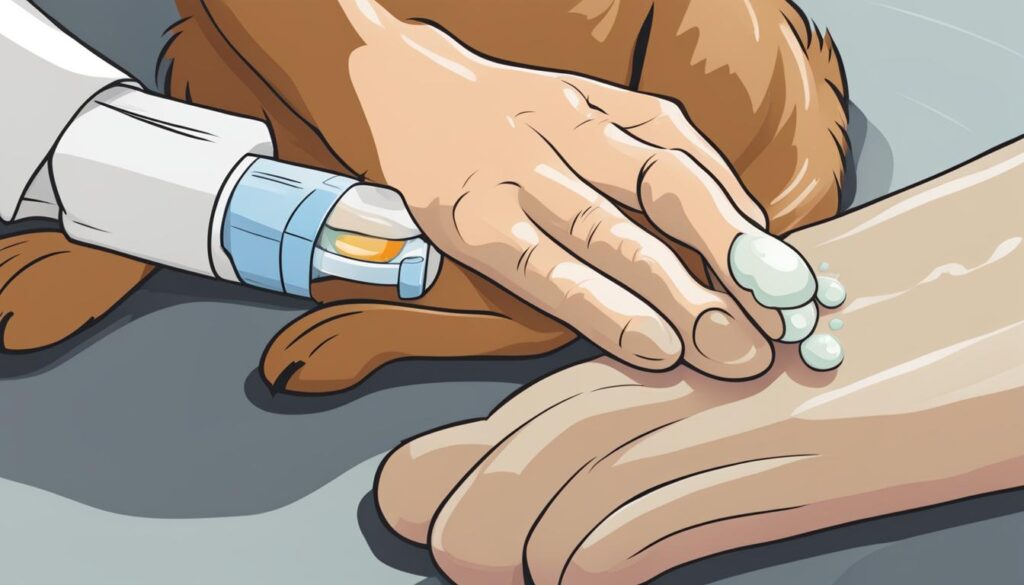If you’re a dog owner, you know how important it is to keep your furry friend healthy and happy. Unfortunately, as dogs age, they can develop health conditions, such as arthritis, that can significantly impact their quality of life. The good news is that you can take steps to manage arthritis in dogs and mitigate its effects by paying attention to your pet’s diet.
Dog nutrition and arthritis are intrinsically connected. Providing your pet with a well-balanced diet can help promote their overall health and help alleviate the symptoms of arthritis in dogs. However, it’s not just about what you feed your dog, but also the nutrients they need to support their joint health.
In this guide, we will explore the link between dog nutrition and arthritis to help you understand the vital role nutrition plays in managing dog arthritis. We’ll also cover specific dietary strategies that can help manage arthritis and share natural remedies and traditional treatment options available to help relieve pain and improve mobility for your furry friend.
Together, we can help our furry friends live their best lives by supporting their joint health with appropriate dog nutrition and arthritis management. Keep reading to learn more.
Understanding Canine Nutrition
Your dog’s nutrition is essential to their overall well-being, and it is no exception when it comes to managing their arthritis. A balanced diet can help reduce inflammation, maintain healthy joints, and relieve the discomfort associated with dog arthritis. So what does a healthy canine diet consist of, and how can it aid in managing arthritis?
First and foremost, protein is an essential nutrient for dogs. It is crucial for maintaining healthy muscles and aiding in tissue repair. Lean sources of protein, such as chicken and fish, are ideal for dogs and help promote a healthy weight, reducing excess strain on their joints.
In addition to protein, carbohydrates are a necessary component of a dog’s diet. However, not all carbohydrates are the same, and some can be detrimental to your pet’s health. Choose complex carbohydrates, such as sweet potatoes, over simple carbohydrates like white bread and pasta.
While fats have a bad reputation, they are an essential component of a balanced diet. Omega-3 and Omega-6 fatty acids, found in fatty fish, like salmon and trout, and flax oil, are especially important for joint health. These healthy fats help reduce inflammation, alleviate pain and swelling, and keep your dog’s coat looking shiny and healthy.
The Importance of Hydration
Hydration is just as critical for your dog as it is for you. Adequate water intake helps maintain healthy joints and flushes out toxins that can contribute to arthritis symptoms. Make sure to provide fresh, clean water for your pet at all times, and consider incorporating wet food into their diet to increase their water intake.
The Role of Supplements
While a well-balanced diet is the foundation of your dog’s nutrition, supplements can aid in managing arthritis symptoms. Glucosamine and chondroitin are commonly used to support joint health, improve mobility, and reduce pain. However, it is essential to consult with your veterinarian before introducing any new supplements into your dog’s diet.


The Link Between Nutrition and Arthritis
If your dog has been diagnosed with arthritis, the right diet can make all the difference in managing their symptoms. Joint health in dogs is directly linked to their nutrition, making it essential to feed your furry friend a balanced diet that supports their overall well-being. Incorporating specific nutrients and supplements can help reduce inflammation and support joint function, improving mobility and alleviating pain associated with arthritis in dogs.
Omega-3 fatty acids, found in fish oil, are beneficial for reducing inflammation in the body and can promote joint health in dogs. You can also add glucosamine and chondroitin supplements to your dog’s diet, which help improve joint mobility and provide relief from arthritic discomfort. Foods high in antioxidants, such as leafy greens, berries, and sweet potatoes, can also reduce inflammation and support your dog’s immune system.


“Nutrition can play a significant role in managing arthritis in dogs, by incorporating joint-supportive ingredients and supplements, you can help alleviate their painful symptoms and improve their quality of life.”
Managing Arthritis Through Diet
If your furry friend is suffering from arthritis, a carefully planned diet can help manage their condition and reduce associated discomfort. Here are some essential dietary strategies that can help:
- Fiber-rich foods: A high-fiber diet can help your dog maintain a healthy weight, which is crucial for managing arthritis. Examples of fiber-rich foods include brown rice, whole grains, sweet potatoes, and green leafy vegetables.
- Omega-3 fatty acids: Adding omega-3 fatty acids to your dog’s diet can help reduce inflammation in their joints. You can find these in fish oil supplements or fatty fish like salmon.
- Joint-friendly supplements: Glucosamine and chondroitin sulfate supplements can reduce inflammation, repair damaged joint tissues, and improve mobility. You can find these supplements in many pet stores or online.
- Lean protein: Lean protein sources like chicken, turkey, and fish can help maintain muscle mass and keep your dog at a healthy weight.
When designing a diet plan for your arthritic dog, consider consulting with a veterinarian or a canine nutritionist. They can help create a personalized plan that best fits your pet’s specific needs and medical history.


Natural Remedies for Dog Arthritis
If your furry friend is suffering from arthritis, you may be wondering if there are any natural remedies that can offer relief. While traditional treatments such as medication and physical therapy can be effective, natural remedies may also provide additional benefits.
One popular natural remedy for dog arthritis is the use of herbal supplements. Certain herbs such as turmeric, ginger, and boswellia have anti-inflammatory properties that can help reduce joint pain and inflammation.
| Herb | Benefits |
|---|---|
| Turmeric | Reduces inflammation and pain |
| Ginger | Anti-inflammatory and pain-relieving properties |
| Boswellia | Reduces joint swelling and stiffness |
In addition to herbal supplements, you may also consider incorporating natural foods with anti-inflammatory properties into your dog’s diet. Foods such as salmon, green leafy vegetables, and blueberries can help reduce inflammation and promote joint health.
Another natural remedy to consider is acupuncture. This practice involves the insertion of small needles into specific points on the body to relieve pain and stimulate healing.
Tip: When considering natural remedies for dog arthritis, consult with your veterinarian to determine the best course of action for your pet’s specific needs.
Remember, natural remedies may not work for every dog, and it’s important to consider a combination of traditional and natural treatments to effectively manage arthritis in dogs.


Dog Arthritis Treatment Options
If your furry friend has been diagnosed with arthritis, there are various treatment options available to manage the condition and improve their joint health. You should discuss these options with your veterinarian to determine the best approach for your dog’s specific needs.
One common treatment option is medication. There are several types of drugs available, including nonsteroidal anti-inflammatory drugs (NSAIDs) and corticosteroids, which can help reduce inflammation and alleviate pain. However, these drugs can have side effects, so it’s essential to use them only under veterinary supervision.
In addition to medication, physical therapy can help manage dog arthritis. Therapeutic exercises, such as swimming, can help improve joint mobility and relieve pain. Massage and acupuncture are also known to provide relief to some dogs. Consult with your veterinarian or a certified canine rehabilitation specialist to determine the appropriate physical therapy regimen for your dog.
In more severe cases, surgery may be an option. Joint replacement surgery can relieve pain and restore mobility in some dogs, although it is typically reserved as a last resort.
It’s important to note that there is no one-size-fits-all approach to managing dog arthritis. Treatment options will depend on your dog’s specific needs, the severity of their condition, and their overall health. Your veterinarian can help you determine the best course of action for your furry friend.


Conclusion
As a dog owner, taking care of your pet’s joint health is crucial for their overall well-being. By understanding the link between your dog’s nutrition and arthritis, you can make informed choices to manage their symptoms and improve their joint health.
Remember, a well-balanced diet is key to reducing pain and inflammation associated with arthritis in dogs. Consult with your veterinarian to create a personalized diet plan that includes joint-friendly supplements and avoids ingredients that may exacerbate your pet’s symptoms.
Additionally, there are various natural remedies and traditional treatment options available to provide arthritis relief for dogs. From herbal supplements to medications and physical therapy, these interventions can improve mobility and enhance your pet’s quality of life.
Overall, taking a holistic approach to your dog’s health and wellness is the best way to manage arthritis and promote joint health. By prioritizing joint health for dogs, you can ensure that your furry friend enjoys a happy, healthy life for years to come.
FAQ
How does nutrition impact arthritis in dogs?
Nutrition plays a crucial role in managing arthritis in dogs. The right diet can support joint health, reduce inflammation, and alleviate symptoms associated with arthritis.
What are the essential nutrients for canine nutrition?
Canine nutrition requires a balanced mix of proteins, carbohydrates, healthy fats, vitamins, and minerals. These nutrients are essential for your dog’s overall health and well-being, including their joint health.
Can a dog’s diet help manage arthritis?
Yes, a well-planned diet can help manage arthritis in dogs. Choosing joint-friendly ingredients, incorporating supplements like glucosamine and omega-3 fatty acids, and managing weight can all contribute to better joint health and reduced arthritic discomfort.
Are there natural remedies for dog arthritis?
Yes, there are natural remedies that can provide relief from dog arthritis. Herbal supplements, such as turmeric and Boswellia, as well as home remedies like warm compresses and gentle exercise, can help reduce pain, inflammation, and improve your dog’s quality of life.
What are the traditional treatment options for dog arthritis?
Traditional treatment options for dog arthritis include medications like nonsteroidal anti-inflammatory drugs (NSAIDs), physical therapy, and joint supplements prescribed by a veterinarian. These interventions can alleviate pain, improve mobility, and enhance your dog’s overall well-being.
How can I optimize my dog’s joint health?
To optimize your dog’s joint health, ensure they receive a well-balanced diet tailored to their individual needs. Consult with a veterinarian to create a personalized diet and treatment plan that focuses on joint health, including regular exercise, weight management, and appropriate supplements.

